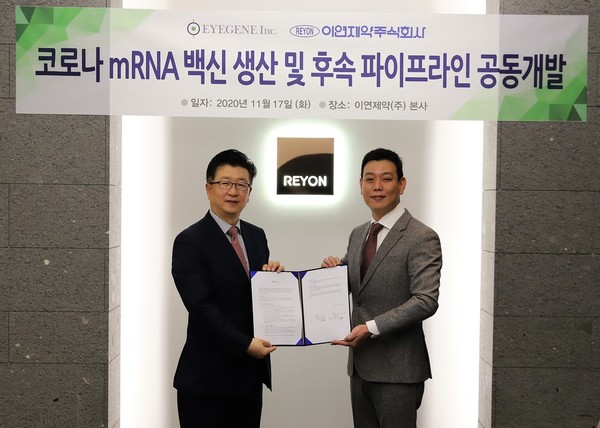Eyegene has been collaborating with Reyon Pharmaceutical since last year to let Reyon produce clinical samples of a Covid-19 mRNA vaccine under an MOU.
However, Eyegene recently started searching for another partner, and the relations between the two companies seemingly turned sour.
Although the two companies said their MOU remained intact with ample opportunities for joint development of follow-up pipelines, they have different short-term goals. While Eyegene has to develop an mRNA vaccine as soon as possible, Reyon is focusing more on completing the construction of a plant in Chungju, North Chungcheong Province.

On Wednesday, Eyegene said it would consign the production of Covid-19 mRNA vaccine clinical samples to a company other than Reyon Pharmaceutical in the second half of the year.
In November, the two companies signed an MOU to produce mRNA vaccine candidate EG-COVID and develop follow-up pipelines jointly. “Although we signed the MOU with Reyon, we will not consign the production for the second half. We’re looking for another company,” an official at Eyegene said.
Eyegene is working on a Covid-19 mRNA vaccine candidate EG-COVID.
Unlike Moderna’s or Pfizer/BioNTech’s mRNA vaccines that use lipid nanoparticles (LNPs), Eyegene’s vaccine uses cationic liposome technology.
Eyegene plans to apply for a phase-1 study later this month.
Before a clinical trial, Eyegene needs a mass-production of clinical samples of EG-COVID. For Eyegene, Reyon was the optimal partner because it was to complete the plant in Chungju in June.
Reyon has spent about 290 billion won on building the plant in Chungju since 2017. The company has repeatedly said that the new plant can mass-produce gene therapies such as plasmid DNA (pDNA), mRNA, and adeno-associated virus (AAV).
However, the reality was different from what Eyegene had expected.
An official at Eyegene told Korea Biomedical Review that Reyon’s preparation at the Chungju plant was insufficient, while Eyegen had to start producing clinical samples in the second half.
Reyon was aware of Eyegene’s complaints.
“It is true that we haven’t signed a deal to produce Eyegen’s mRNA vaccine clinical samples. We’re also aware that Eyegen is contacting other companies for clinical sample manufacturing,” an official at Reyon said.
However, the construction of the plant in Chungju will be completed this month, he added.
Industry watchers said Reyon might have been too lax about the production schedule at the Chungju plant. The company did not consider the time taking from the end of the plant construction to the start of the production of biopharmaceutical products and hastily tried to sign a deal with Eyegene, observers said.
“A completion of a biopharmaceutical factory does not mean it can start manufacturing right away. It has to receive validation, conduct an ‘engineering run’ and pilot production,” a biotech industry official said. “I can’t generalize the time, but it usually takes three months from a plant completion to production.”
Despite some cracks in the relationship, the two companies opened the possibility of cooperation in the future.
Eyegene said it would keep the MOU with Reyon, as the company will continue R&D for mRNA platforms and consider producing other pipelines.
Reyon also said it would continue to collaborate with Eyegene.
“We didn’t sign the MOU only for the Covid-19 vaccine,” an official at Reyon said. “The MOU with Eyegene was also about joint development of follow-up pipelines. So, discussions between the two companies are ongoing.”

